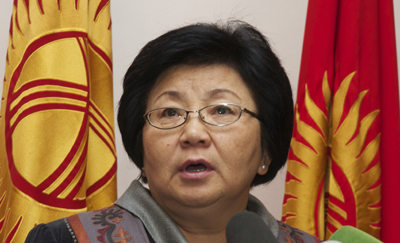World leaders like to invoke terms such as press freedom, human rights, and the rule of law in their speeches, especially to international audience. But in post-Soviet Eurasia, such high-minded words are rarely accompanied by genuine action. A recent commentary in The Washington Post by Roza Otunbayeva, president of Kyrgyzstan, is a testament to this pattern.
In the piece, titled “After revolution, establishing democracy,” Otunbayeva praised opposition activists in Egypt and Tunisia for their victories over authoritarian regimes. Drawing parallels with the 2010 ouster of her authoritarian predecessor, Kurmanbek Bakiyev, Otunbayeva expressed solidarity with the Middle Eastern protesters and pointed at the common challenges ahead:
After years of one-person rule it is important to first ensure that political parties are able to compete around the country and have access to voters, that there is a free press to provide for national dialogue, and that civic associations have space and the opportunity to advocate their interests. Most important, the rule of law must be provided for.
In Kyrgyzstan, according to Otunbayeva, the leaders chose to build a foundation on the rule of law. One might praise the president’s assertions if only Kyrgyz authorities had not imposed a life prison term on Azimjon Askarov, a prominent reporter and head of a local human rights group, on fabricated charges last September.
Askarov’s imprisonment is a vivid example of deteriorating press freedom conditions in Kyrgyzstan, particularly its southern regions, where attacks on the press were carried out with impunity despite the change of political regimes. In several cases, regional authorities were named as perpetrators and masterminds. CPJ research shows that Uzbek-language media and reporters, including Askarov, were targeted in retaliation for the independent coverage of the bloody interethnic conflict that engulfed southern Kyrgyzstan in June. Other cases include a pending prosecution on fabricated extremism charges against the independent editor Ulugbek Abdusalomov; threats against contributors to the U.S. government-funded Radio Free Europe/Radio Liberty; and seizure of property and forced closure of Uzbek-language broadcasters Osh-TV and Mezon TV.
Askarov, director of the rights group Vozdukh and contributor to the independent news website Voice of Freedom, continues to languish in jail after a higher court denied his appeal. His politicized prosecution–despite a lack of evidence, numerous procedural violations in the probe, and his reported torture in custody–clearly contrasts with Otunbayeva’s stated goals.
According to CPJ research and statements by local rights activists, Askarov was documenting human rights abuses and law enforcement agents’ inaction during ethnic conflict in southern Kyrgyzstan at the time of his arrest in June. In a December interview with a local journalist, Askarov said that when violence erupted in Bazar-Korgon he followed his reportorial duties and filmed the aftermath of the bloodshed–interviewing the wounded and counting the killed in the firm belief that his work would spur a probe into the conflict. But instead of using his findings to serve justice, Kyrgyz authorities accused him of organizing a brutal revolt in his native village of Bazar-Korgon and participating in the murder of a local police officer. Askarov denied these accusations.
In court, prosecutors failed to produce substantial evidence against Askarov. According to CPJ sources, secondary witnesses–relatives and colleagues of the slain police officer–produced contradictory statements and were unable to clearly elaborate on Askarov’s role in the incident. During the trial, authorities also dismissed reports of his torture in custody despite visible bruises on his face and his back. Attacks and threats against his lawyer–made in the presence of local police and a judge–were also ignored.
Local sources told CPJ they believed the charges were filed in retribution for Askarov’s work. For years he meticulously investigated and publicized reports of detainees’ torture by local police. Those same police testified against him in court.
Otunbayeva is well aware of this high-profile case. In a public letter to the president, CPJ urged her to ensure a fair trial for Askarov. We have received no response. Meanwhile, Askarov continues to be imprisoned as allegations of his torture in custody and of his lawyer’s harassment remain uninvestigated. The rule of law, the significance of which Otunbayeva so eloquently describes in her opinion piece in the Post, must be guaranteed for every citizen of Kyrgyzstan, including Askarov. It is ironic that it is he–the defender of those same “unalienable rights and freedoms” that Otunbayeva preaches–who is serving a life term for doing his job. His president, meanwhile, turns a deaf ear and blind eye to his suffering.
Askarov’s second appeal is pending in Kyrgyzstan’s Supreme Court. President Otunbayeva must use this opportunity to demonstrate her true commitment to press freedom and the rule of law by ensuring that he receives a fair hearing.
